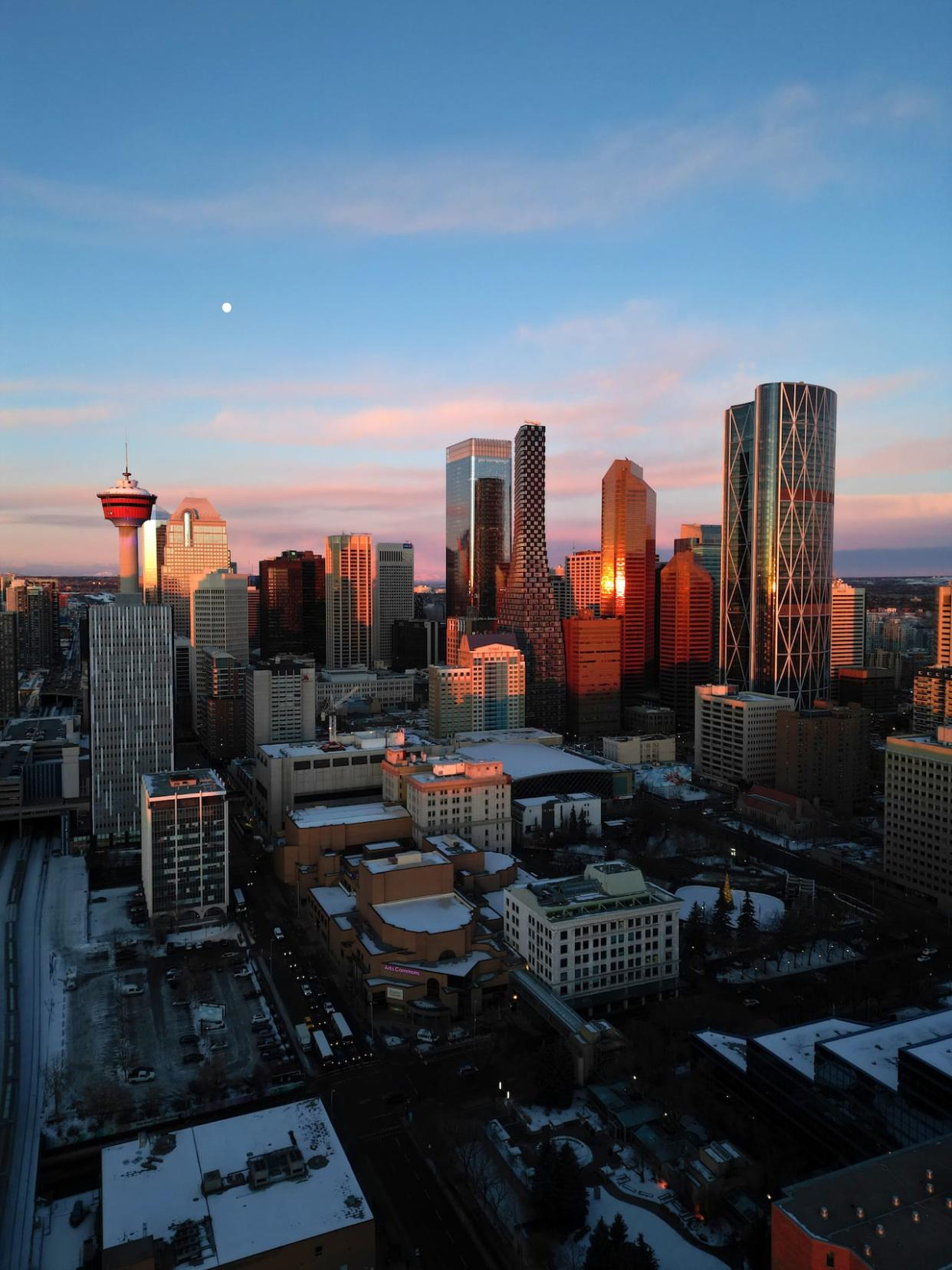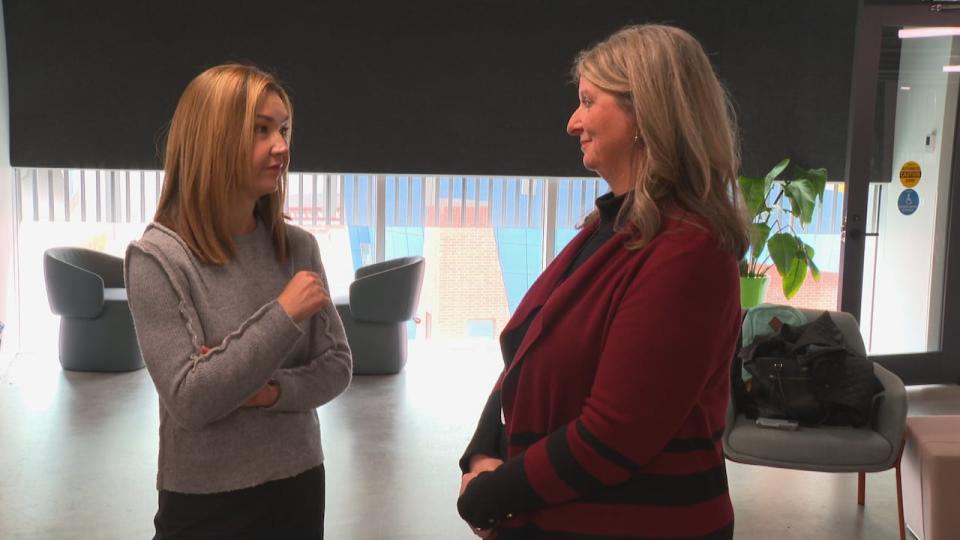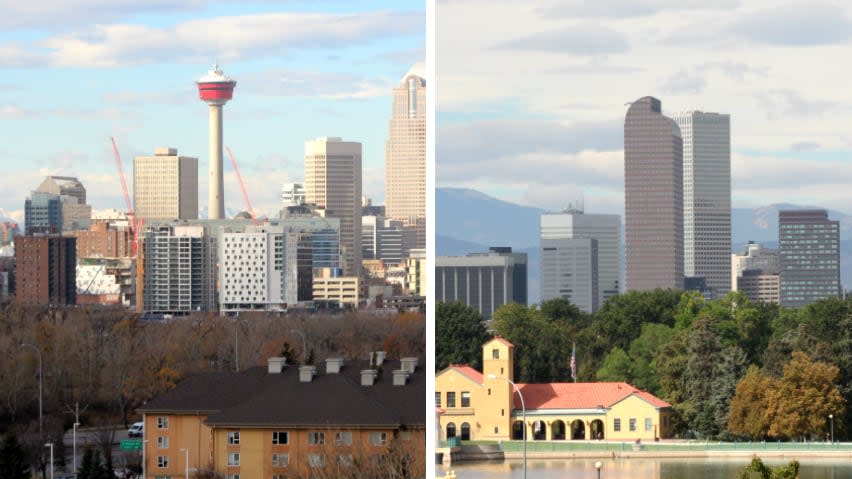Calgary and Denver looking to one another, again, for downtown inspiration

- Oops!Something went wrong.Please try again later.
Denver and Calgary are twinning in many respects — perhaps they were separated at birth.
Both have the mountains to the west, both built up around rail, and both have a history of riding the ups and downs of the energy industry.
But at some point, Denver got off that economic track and uncoupled from that train to focus on a buzzword that's now seeped into Calgary's lexicon: diversification.
Historically, Calgary has looked to Colorado's capital for inspiration, even sending a delegation to the Mile High City years ago — but, oh, how the tables have turned.
This week, Denver is in Calgary with a delegation eager to take home some lessons as it looks to revitalize a struggling downtown.
A bit of downtown history
"We got a head start on dealing with office vacancy in the downtown because we had the seismic shift in the oil and gas sector," said Sheryl McMullen with Calgary's Downtown Strategy team, pointing to the drop in world oil prices in 2014.
It was a seismic shift with cascading consequences.
"We lost about $16 billion dollars of value," McMullen said.
That tax burden shifted to properties outside of the core, prompting a temporary solution: rebates to non-residential accounts.
But that was only a Band-Aid fix. McMullen said there needed to be a lasting change.

Downtown Denver Partnership CEO Kourtny Garrett, left, and Sheryl McMullen with Calgary's Downtown Strategy talk after a session in the Platform Innovation Centre in Calgary on Tuesday. (Helen Pike/CBC)
"We need to do something different, to invest in ourselves," McMullen said. "That's where the whole notion of office-to-residential conversions for other adaptive reuse was really born."
Revitalization, she points out, is breaking that cycle. As Calgary diversifies and shifts from a primarily oil-and-gas-driven economy, downtown needs to take on a future-proof philosophy, too. Because, she said, the realization in 2017-18 was that the next boom might not come.
Calgary's approach spared some pandemic impacts
A shift in office culture — the war between working downtown and working from home — has done a number on many city centres. And it's a frustrating conundrum for cities and provinces alike.
Take Ontario Premier Doug Ford's plea to the feds in March: "It sounds crazy. I'm begging people to go to work for three days — not that they aren't working at home, but it really affects the downtown."
In 2019, Denver had an office vacancy sitting between seven and 12 per cent.
Downtown Denver Partnership CEO Kourtny Garrett said Denver had made intentional investments in the 1990s that really set the city up well. They put all of the city's major sports teams at the heart of their city, and converted the historic Union Station into a multi-modal hub — one that goes to the city's international airport.

Two cities with very similar skylines. On the left is Calgary's downtown while the right is downtown Denver, pictured in 2016. (Rachel Maclean/CBC)
"Those Investments have paid dividends and really created an incredibly strong market in Denver from the early 2000s through really the pandemic," Garrett said.
These days, that office vacancy rate is in step with Calgary's at about 30 per cent. At that level, Garrett said, they are seeing their commercial retail struggle without enough downtown business to sustain a vibrant core.
As part of the Denver delegation, Garrett will meet and mingle with Calgary developers and those working on economic development — exchanging ideas along with business cards.
She'll take a look at the East Village and explore Stephen Avenue, which she mentions is similar to the 16th Street Mall in Denver. And talk about some of Calgary's public-private partnerships.
"There's some beautiful lessons to learn here in Calgary," she said. "Looking at those intentional moves that are carrying some of the challenges we have short term and thinking about downtown in the next five, 10, 15 years."
McMullen said this healthy sibling rivalry between the two cities can also be valuable for Calgary. She's got her ears tuned to how the city can learn and collaborate with Denver. One lesson: how to really cement post-secondary campuses and attract students to take up residence downtown.
She said this part is critical, because a rental unit or condo for someone living full-time in Calgary takes up more space than say a dorm. It's a matter of hundreds of new downtown residents versus three to four thousand young people filling downtown streets.
"Just in terms of that vibrancy and having people on the streets because it makes it a safer environment for everybody," McMullen said.
And providing that critical mass of people to sustain businesses past the 9-to-5: getting groceries, going to appointments and grabbing coffees.

